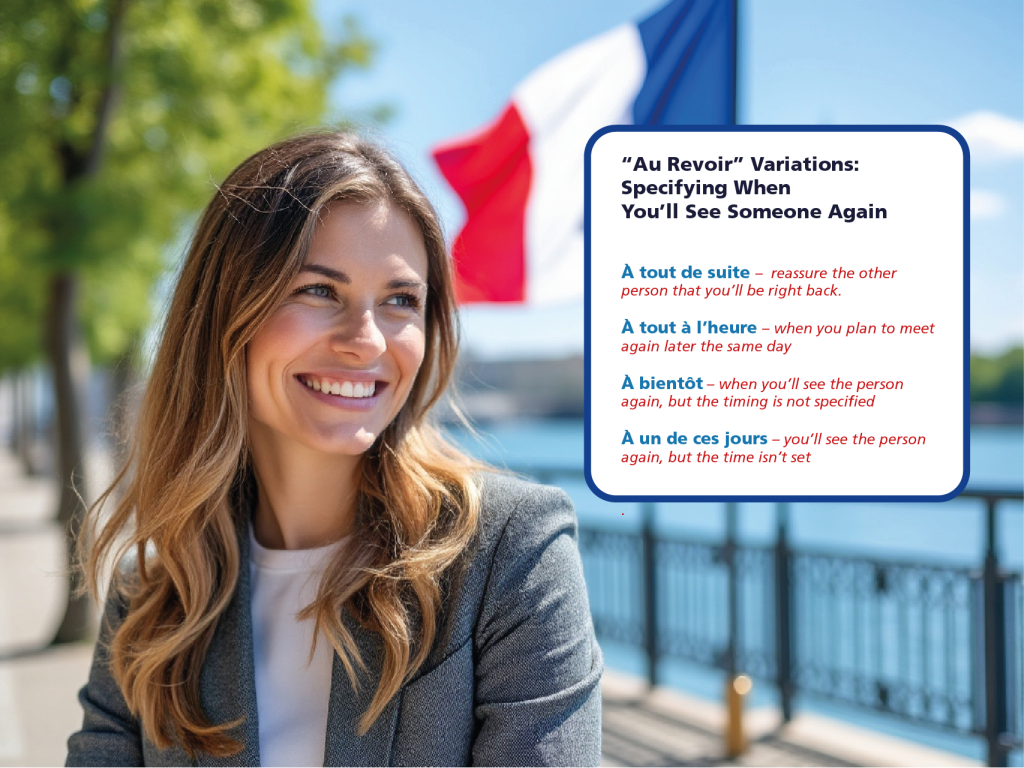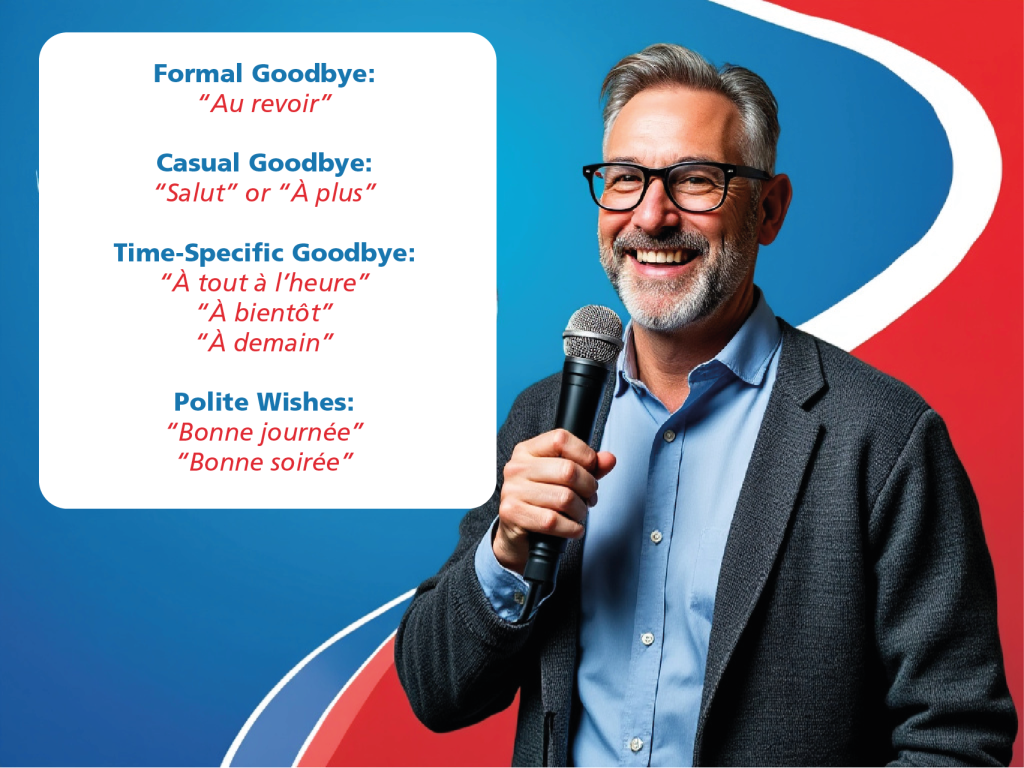If you’re traveling to France or learning French, you might be wondering how to say “bye” or “goodbye.” Just as English has different ways to say goodbye depending on the context, French offers a variety of expressions that reflect familiarity, time of day, or even regional quirks. Here’s your ultimate guide to saying goodbye in French, from formal to casual farewells.
The Classic Goodbye: “Au revoir”
The most common and widely recognized way to say “bye” in French is “au revoir.” This phrase literally means “until we see each other again” and is appropriate in most contexts. Whether you’re saying goodbye to someone at a café, leaving a store, or parting ways with friends or colleagues, “au revoir” is a safe and polite choice. This phrase is understood throughout France and French-speaking regions, so you’ll be using it frequently.
Casual Goodbyes: “Salut” and “À Plus”
For a more casual or friendly goodbye, especially with people you’re close to, you can use “salut.” This word works for both greetings and farewells, similar to the way “hi” and “bye” work in English. It’s informal and typically used with friends, family, or peers, but be cautious when using it in professional or formal settings. Like other casual expressions, “salut” is common among younger people and often conveys a friendly, approachable tone.Another casual option, particularly popular among younger people, is “à plus.” This is short for “à plus tard” (see you later) and is pronounced with the “s” at the end. You’ll hear this phrase among friends and peers, especially in informal settings. It’s a simple way to say, “See you soon” without a formal commitment.
Saying Goodbye in Regional Bars and Cafés: “M’sieurs Dames”
In certain parts of France, especially in more rural or traditional settings, you might hear people say “M’sieurs Dames!” as they enter or leave a local café or bar. This greeting is a contraction of “messieurs, dames” (gentlemen, ladies), and is typically used to address a group of people. It’s a quick, friendly greeting that acknowledges everyone in the room, even if you don’t know them personally. It’s often used by locals who are familiar with each other or by people looking to keep things lighthearted in a neighborhood setting.
“Au Revoir” Variations: Specifying When You’ll See Someone Again
In French, you can add a bit more specificity to your goodbyes by indicating when you’ll meet the person again. Here are a few options:
- À tout de suite – Use this when you’re leaving but expect to see the person in just a few minutes. For example, if you’re momentarily stepping out of a room, you could say, “à tout de suite” to reassure the other person that you’ll be right back.
- À tout à l’heure – This expression means “see you later” and is used when you plan to meet again later the same day, often within an hour or two.
- À bientôt – This phrase translates to “see you soon” and is used when you’ll see the person again, but the timing is not specified. It could be within the next few days or sometime in the near future.
- À un de ces jours – Similar to “à bientôt,” this expression is used to imply that you’ll see the person again, but the time isn’t set. It’s friendly and slightly more open-ended.
- À la prochaine – A casual expression that means “until next time.” This phrase is commonly used among friends and peers. If you’re on informal terms with someone, you might also say “à la prochaine fois” (until the next time).
- À un de ces quatre – This colloquial phrase is often used to imply a vague reunion, similar to “see you one of these days” in English. It’s more commonly used among friends or casual acquaintances and is a fun, informal way to say goodbye.

Time-Specific Farewells: Using “À” for Future Plans
When you have specific plans to see someone again, you can use the preposition “à” followed by a specific time or day:
- À demain – “See you tomorrow”
- À ce soir – “See you tonight”
- À jeudi – “See you Thursday”
- À la semaine prochaine – “See you next week”
This structure is handy because it lets you communicate exactly when you’ll meet again. You might say, for example, “à lundi” to let someone know you’ll see them next Monday, or “à ce soir” if you’ll be catching up later in the evening.
Adding Politeness: Good Wishes and Season-Specific Goodbyes
To make your goodbye more polite or show extra warmth, you can add a phrase that wishes the person well based on the time of day or season:
- Bonne journée – “Have a good day”
- Bon après-midi – “Have a good afternoon”
- Bonne soirée – “Have a good evening”
- Bonne nuit – “Good night”
- Bon weekend – “Have a good weekend”
These expressions are used frequently in French-speaking countries and add a touch of friendliness to your farewell. For example, if you’re leaving a store in the morning, you might say “au revoir, bonne journée” to wish the shopkeeper a pleasant day. In the evening, “bonne soirée” is appropriate, as it aligns with the time of day and shows thoughtfulness.

Formal Farewells: “Adieu”
Although not commonly used in everyday language, “adieu” is another way to say goodbye in French. However, this expression is typically reserved for more dramatic or permanent farewells. “Adieu” literally means “to God” and implies that you don’t expect to see the person again. For this reason, it’s rare in modern French conversations, except perhaps in specific regions or historical contexts. You’ll sometimes find it in literature or older movies, where it is used to convey a serious, final goodbye.
Putting It All Together: Crafting the Perfect Goodbye
With all these options, a standard French farewell can include several elements to communicate politeness, timing, and well-wishes. For example, if you’re leaving a social event and you’ll see someone next week, you could say:
“Au revoir, bonne soirée, et à lundi !”
This farewell combines the main goodbye phrase (“au revoir”), a polite wish for the evening (“bonne soirée”), and a specific future meeting time (“à lundi”). It’s a friendly and complete way to part ways, and it showcases the layered nuances of saying goodbye in French.
Essential French Farewells: When and How to Use Them
Au revoir
The classic farewell meaning “until we meet again.” Versatile and polite, it’s suitable for most settings, both formal and informal—business meetings, casual chats, or when leaving a shop.
Bonne journée / Bonne soirée
These mean “have a good day” and “have a good evening.” Use “bonne journée” for parting during the day and “bonne soirée” for the evening. Perfect for polite exchanges in shops or after appointments.
À tout à l’heure
“See you later” for when you expect to meet someone again later in the day. Works well in both professional and casual contexts.
À plus tard / À plus
Also meaning “see you later,” this phrase is casual and often shortened to “à plus” in text or conversation. Suitable for friends and informal acquaintances.
À bientôt / À très bientôt
“See you soon” is perfect when the next meeting isn’t scheduled but expected soon. Add “très” for “very soon.” Works well in both formal and friendly contexts.
À tout de suite
Meaning “see you very soon,” it’s ideal for immediate meet-ups. Use it when parting just before a quick follow-up meeting or rendezvous.
À la prochaine
“Until next time” is a friendly way to say goodbye when you don’t know exactly when you’ll see each other again. Suitable for acquaintances and friends.
À demain
Reserved for when you’ll see the person the next day, making it ideal for workplace farewells or with classmates.
Salut
This informal farewell means both “hi” and “bye,” ideal for friends, family, or casual peers.
Au plaisir de vous revoir
“Looking forward to seeing you again” is a warm, polite phrase for professional or social goodbyes, leaving a positive impression.
Bonne continuation
Use “bonne continuation” when parting after a project or event, wishing someone the best going forward. Common in professional settings.Adieu
A serious or dramatic farewell meaning “to God.” Rarely used in casual conversation, it implies a final goodbye and is more common in literature.

Casual Farewells and Colloquial Expressions
Casual goodbyes bring a touch of authenticity to everyday interactions. Here are some colloquial phrases commonly heard among French speakers:
- On s’appelle (On sah-pel) – Meaning “let’s call each other,” it’s a friendly way to say “let’s stay in touch.”
- On se tient au courant (On seh-tyen o koo-ran) – Similar to “on s’appelle,” this phrase means “let’s keep each other updated.”
- À tout’ (Ah toot) – A contraction of “à tout de suite” or “à tout à l’heure,” often used informally to say “see you later.”
- À un de ces quatre (Ah uhn deh say kaht) – Translating loosely to “see you one of these days,” it’s a casual, friendly phrase.
- Tchao / Tchuss – Borrowed from Italian and German, these add a European flair to an easygoing farewell.
- Bise / Bisous (Bees / Bee-zoo) – Meaning “kisses,” these are used among close friends or family, often as a warm way to end a conversation.
These phrases add personality and warmth, helping you sound more like a native speaker in casual settings.
Summary: Choosing the Right “Bye” for Every Situation
Each French goodbye has its own tone and usage, allowing you to tailor your farewells to different contexts. Here’s a quick guide to help you choose:
- Formal Goodbye: “Au revoir”
- Casual Goodbye: “Salut” or “À plus”
- Time-Specific Goodbye: “À tout à l’heure,” “À bientôt,” “À demain”
- Polite Wishes: “Bonne journée,” “Bonne soirée”
- Rare or Dramatic Goodbye: “Adieu”
Whether you’re saying goodbye to friends, family, or people you’ve just met, there’s a perfect French expression to match the occasion. Each phrase adds a little nuance to your goodbye, making the interaction more memorable and meaningful.

Final Thoughts: Beyond “Bye”
Mastering the art of saying goodbye in French goes beyond words—it reflects cultural sensitivity and shows that you’re familiar with the customs of the language. Whether you’re traveling through France or conversing with French speakers elsewhere, a thoughtful farewell leaves a positive impression. So, whether you keep it simple with “au revoir” or try out the more playful “à un de ces quatre,” your goodbye in French will be a small but meaningful part of your language journey.
Ready to take your French to the next level? At Real French, we offer immersive, personalized courses designed to help you master the language with confidence. Whether you’re a beginner or looking to polish your conversational skills, our tailored programs will support you in achieving fluency and connecting authentically with French culture. Join us and make every “au revoir” sound like a native! Au revoir, et bonne chance!


